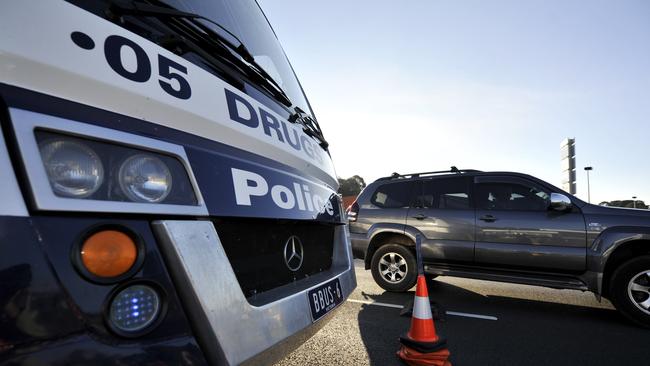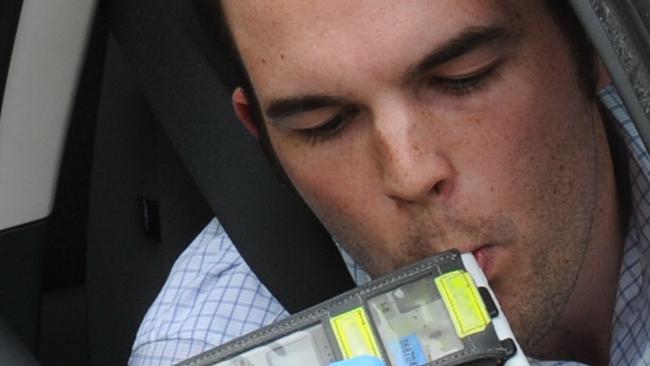New report finds Victoria Police ignored warning signs on fake breath tests going back to 1996
Victoria Police’s bogus breath test scandal is worse than first thought, with a new report revealing new instances of faked breath tests going back more than 20 years.
VIC News
Don't miss out on the headlines from VIC News. Followed categories will be added to My News.
Victoria Police’s fake breath-tests scandal is worst than first thought.
Extra incidents of faked tests dating back to 1996 are revealed in a bombshell internal report into how cops fudged figures to meet targets in order to protect budgets.
The full report into the falsification of preliminary breath tests has criticised the force for siting idle while a “systematic problem” became worse and more widespread.
POLICE FUNDING PULLED AFTER BREATH TEST CON
OLD DRUNK DRIVERS A GROWING ROAD MENACE
OUTRAGEOUS DRUG-DRIVING LOOPHOLE
Victoria Police were embroiled in a breath test scandal last year, prompting an independent investigation by former Victoria Police Chief Commissioner Neil Comrie, after it showed 258,000 tests had been faked over five-and-a-half years.
He has previously scolded the force for setting unrealistic targets that were not evidence-based and led to police doing bogus tests to protect drink-drive budgets and show the drink-drive message was working.
The report said police had to return negative results on 99.5 per cent of breath tests and there was “tension” when greater numbers were detected contrary to Victoria Police targets, affecting its budget outcomes.
In the full report., released today with some redactions, it was revealed there were instances of falsified breath tests in 1996, 1999, 2004 and 2014.
In one case, officers at Portland failed to do breath tests but recorded registrations numbers of drivers who were waved through.

In 1999, an investigation was sparked after there was a discrepancy between the number of breath test to the number of straws supplied.
Then in 2004 it was uncovered officers at Frankston had over inflated the amount of drink drive tests they did.
Two police officers were identified in 2014 falsifying 82 breath tests numbers, including manipulating the device to record false readings.
The report, from Taskforce Deliver, said the past instances, which happened in various locations, were potentially an indicator of a “systemic problem that required a more substantial investigation and response from Victoria Police”.
“Instead, they were only investigated in relation to the behaviour of individual members and generally treated as isolated incidents. As a consequence, it would seem that, based on the findings of this current Taskforce Deliver investigation, the behaviour continued and became widespread common practice,” the investigation found.
The report stated force command should have ensured its drink drive strategy did not discourage actual detection or bring about perverse outcomes.
“A key objective must be to create an environment where police members involved in delivering PBTs value what they are doing as ‘real police work’. Too narrow a focus solely on numbers should not override the importance of detecting other offences,’ it said.
“Offenders who may be drug affected, unlicensed, disqualified or driving unsafe vehicles need to be equally targeted, as outcomes can be just as traumatic irrespective of the type of offending.”

Mr Comrie put forward 23 recommendations aimed at improving road safety and ending the drink drive rort.
Among them was for Victoria Police to review “the adequacy of resources currently committed” to targeting drug-driving as the number of drug-related fatals continued to rise, while drunk driving deaths are on the decline.
“It is clear from the evidence available that a greater emphasis on drug testing should
produce a positive impact on the reduction of road trauma,” the report said.
Other recommendations included reviewing road safety partnerships to reinvigorate and strengthen arrangements, reconsidering the figure of 99.5 per cent to help with compliance, ensuring all tasking directives are evidence-led and that Victoria Police implements daily audits of breath test results and takes steps to improve supervision to act quickly to stamp out unethical conduct.
It was also suggested Victoria Police reviews its funding agreements with the TAC to provide greater transparency and accountability and develop a strategy for replacement breath test devices.
Following the scandal, advanced tamper-proof technology is being considered to prevent future falsifications and more than 10,000 frontline staff have undergone ethical training.


